But Will It Last?
Historic Preservation Wins Big in U City
by Don Fitz
An April 2016 victory in University City MO saw all three progressive councilpersons winning as well as over 69% voting “Yes” on an unusual amendment to the city charter. Proposition H would require the city to obtain voter approval before disposing of historic buildings. The effort started out as an attempt to block a developer. Then it expanded to protect multiple “heritage sites.” It expanded again into an alliance with people throughout the city opposed to privatization of public services and attacks on the firefighters union. Nevertheless, a danger of losing everything remains.
An historic school
In August 2014 residents of the quiet University Heights community (a neighborhood within University City) learned that a developer hoped to purchase the vacant Delmar-Harvard Elementary School and its playground in order to erect a multi-story apartment building and 5-7 level parking garage in its place. Opposition was intense.
U City lies within the shadow of the private and very rich Washington University, which never hesitates to grab chunks of land, whether or not people are already living there. When University Heights residents saw plans for the overdevelopment of the historic Delmar-Harvard School (D-H) site and learned that developer Henry Warshaw was a former trustee of Washington University, they smelled a rat.
Was there a long-range scheme for a private developer to receive tax abatements for an apartment-parking garage complex by promising future tax revenue for U City, yet, all the while having secret plans to sell the new edifices to Washington University so they could be used as an off-campus dorm? Were this to be done, U City would receive zero tax revenue from the tax-exempt university after residents had footed the tax bill for infrastructure (electric, water, sewage lines, etc).
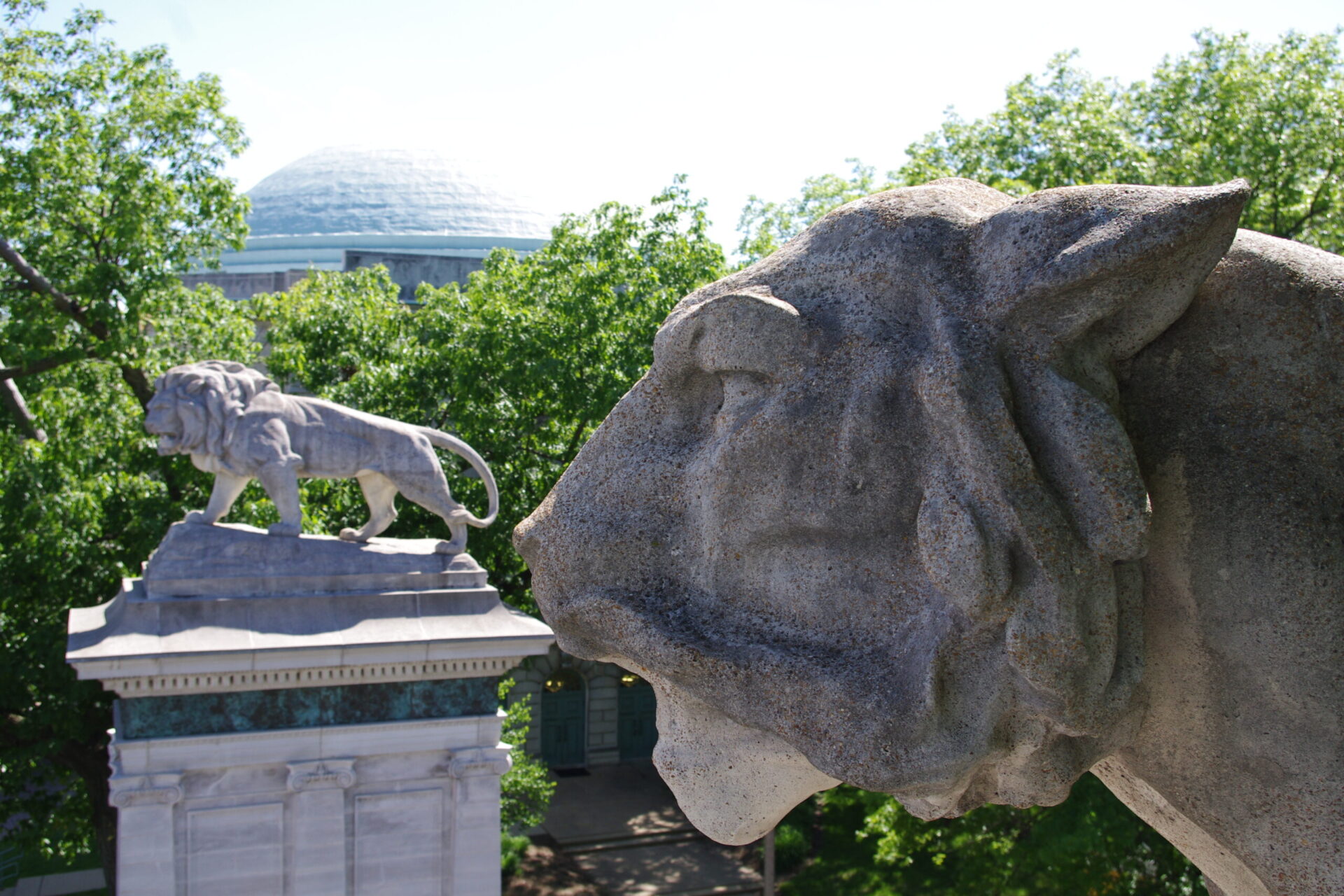
Meetings with the developer went nowhere. He refused to budge on sketches for 5 – 7 stories. Over next few months, opinion was sampled with a vote by the neighborhood board, a door-to-door survey and the annual meeting. All showed over 90% opposition to overdevelopment.
As several residents explored lawsuits that would use our limited legal rights over the D-H site, others thought of broadening the issue to protect a variety of U City's historic buildings. The D-H school is part of a complex of old buildings known as “Civic Plaza.” Part of Civic Plaza includes the magnificent octagonal City Hall and three unique and ornate buildings that the city has failed to upkeep for years: Old Library, Old Firehouse and Police Station.
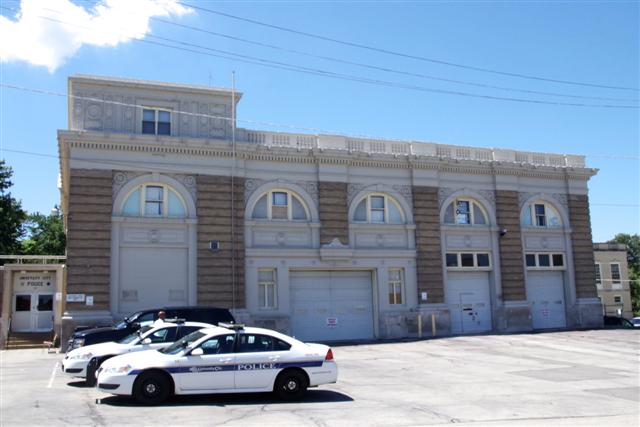
A broader history
It dawned on us that the developer was very likely working behind the scenes to obtain the three buildings left in disrepair, with the adjacent D-H site being only one piece of a grander scheme. If it were possible to throw a monkey wrench into this plan, it could well dampen the developer's lust for the D-H site.
This strategy came out of a May 2015 meeting when we realized that it might be possible to amend the City Charter to restrict the sale of historic buildings. Former City Manager Frank Ollendorff explained how such a charter amendment was passed to protect U City parks in 1990. Similar measures had been passed in City of St. Louis and very recently in Overland MO.
Soon after, attorney Henry Robertson, historian Esley Hamilton and others familiar with legal and historic issues met to discuss how such an amendment needed to be worded to survive court challenges. We had to think “charter amendment” because a law could be easily overturned by the council. The charter amendment would require voter approval prior to disposal of specific city-owned historic buildings. This left out the school district-owned D-H site and all privately owned buildings.
After many discussions, we had a “Heritage Site Initiative” petition. It listed six buildings that are part of Civic Plaza and the Sutter-Meyer House, the first U City farmhouse which is now a museum. We needed signatures by 10% of registered voters and approval by a simple majority of those voting for it to become a part of the charter.

Civic Plaza is next to Delmar Blvd. and just a few blocks away from Washington University. Due to its high number of restaurants and entertainment spots, Delmar was recently named “1 of 10 the best streets in US.” There is a strong incentive to turn it into a combination tourist attraction and hangout for Washington University students.
Many U City residents fear that sale of the D-H site and Civic Plaza buildings could mean the rich cultural heritage embodied in those structures could be trashed for multi-story apartments/dorms, parking garages, and garish shopping pavilions (none of which would pay taxes). If such architectural monstrosities were to go up, our beautiful City Hall would no longer tower above the variety of distinctive structures adjacent to it, but would be dwarfed by modern ugly things built for a quick buck.
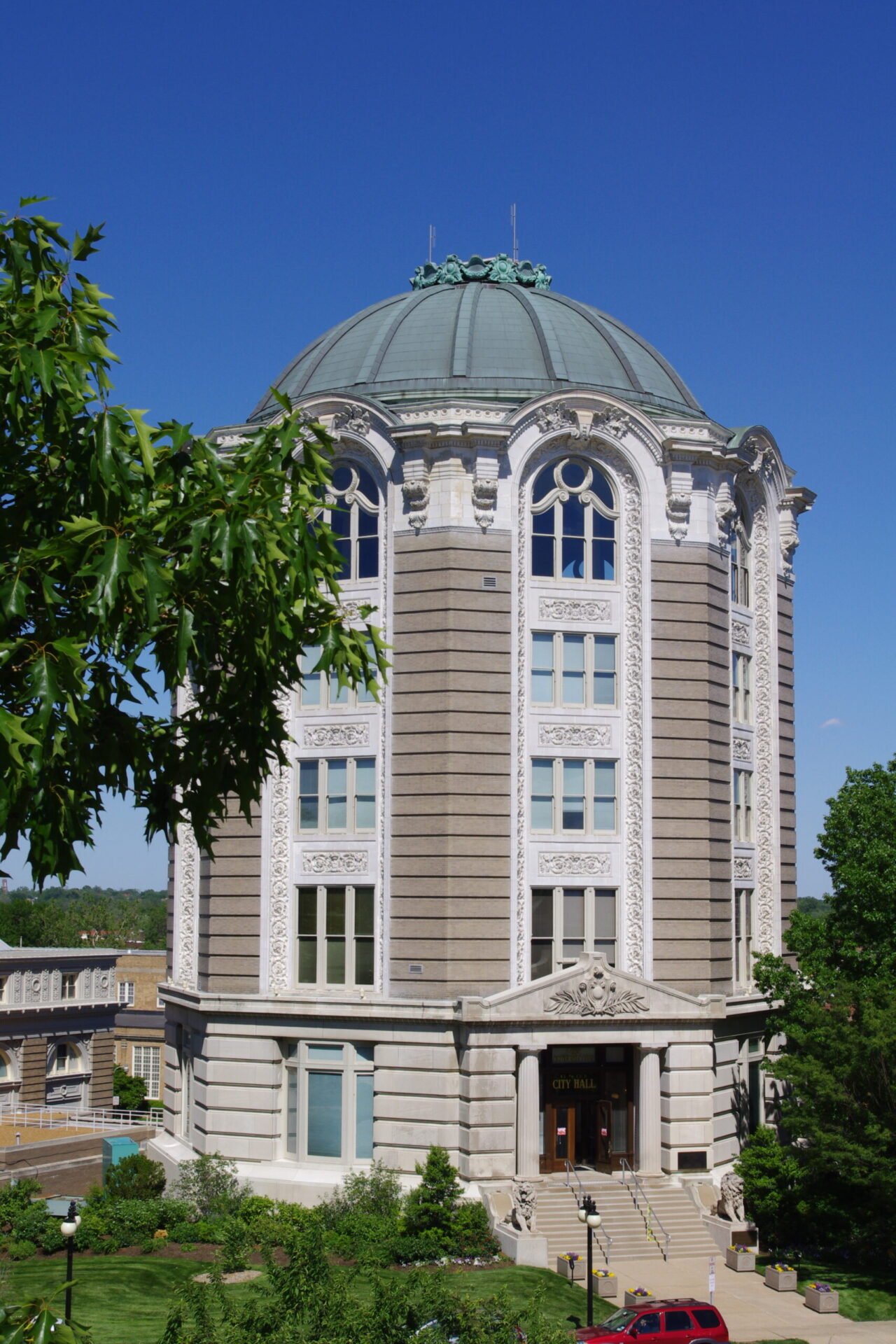
Privatization!
It soon became clear that putting historic buildings out for the highest bidder was one piece of much bigger goings-on. The “privatization” of public property and services has been known by many other names. You may recognize it as “outsourcing.” Or perhaps “cutbacks” or “austerity.” If you have been following what has been happening historically and internationally, you will recognize it as “neoliberalism” or “destruction of the commons.”
Whatever the word used, it expresses a right-wing dogma that government should turn over every function it has to private companies run by the 1% who will profit from it. Right-wing strategists realize that this cannot be done all at once, so they seek to privatize piece by piece. Since conditions are different in different locations, what they try to privatize first depends on where you are.
In U City, the council started out small, outsourcing mulch, which used to be provided to any resident who wanted it for their yard or garden. Now, citizens have to pay for it.
They have scaled back the summer camp-in-the-park, which has been used extensively by children of low income families. The argument was that it was not turning a profit, which, of course, it was never designed to do.
The City began moving full-speed to help the School Board turn over the D-H site to the private developer. Ever since the school closed, children have continued to use its large asphalt-covered playground. The playground has been zoned for “public activity” (which is obviously incompatible with a private company making money off of it). The City violated its own zoning laws by declaring that the developer could turn it into a commercial parking lot.
Trying to put out the firefighters union
The most intense conflict the mayor provoked was with the International Association of Firefighters (IAFF). In 2010 the firefighters endorsed and financially supported the mayor, in part because she seemed much more receptive to its concerns than the outgoing mayor. Once in office, she encouraged a barrage of attacks against the union and community safety.
This treatment, along with a 2013 law allowing firefighters to engage in public activity, led to their support for the write-in candidacy of Steve McMahon for mayor, and city council candidates in 2014. When these candidates lost, six firefighters were suspended without pay for 90 days. The firefighters' successful appeal to the Civil Service Board was ignored by City Manager Lehman Walker.
After the City was taken to federal court, an agreement was reached that included all recommendations of the Civil Service Board and additionally paid the each firefighter $21,000 in damages and $200,000 for their legal expenses as well as back pay and expungement of any record of discipline. All together the City paid $345,000. All six of the firefighters eventually resigned, leaving U City with a loss of over 35 years of combined experience.
The mayor soon stirred outsourcing into her cauldron of vengeance. With only a few days advance notice to councilmembers, outsourcing of ambulance services suddenly appeared on an August 2015 council agenda. Since the IAFF staffed U City ambulances, this attack was not even veiled. It not only jeopardized services and staffing but also the safety of the community since it eliminated back-up ambulance service from neighboring municipalities and reduced the expertise of ambulance workers from two paramedics-firefighters to one paramedic and one EMT.
That night, the council room was packed with over 150 opponents of outsourcing, including many working on the Heritage Sites Initiative. Only two people spoke in favor of outsourcing. One was Jane Cunningham, an outspoken Tea Party fanatic who does not live in University City, but who came to bubble her enthusiasm for the mayor's understanding of “cost-effective government.”
Despite dozens of pleas to hold off a vote until the proposal could be scrutinized, it was rammed through. Residents throughout the city were incensed and an alliance began to take shape between firefighter supporters, members of other unions, citizens concerned with public safety and those concerned with historic preservation. The alliance became more firm during subsequent months as reports trickled in regarding the low quality of non-union ambulance work, delayed response times and even ambulances with no paramedics (linked to at least one death). The mayor continued to stir the cauldron by refusing to release ambulance response-time data and contemptuously reporting in her newsletter that everything was just peachy with the privatized ambulance provider.
Signatures
Concurrently with clashes at city hall, signature gathering for Heritage Sites proceeded. We began collecting signatures on August 4, 2015 and concluded on October 31.
We needed 2547 valid signatures; we turned in 3527; and, 594 were rejected, leaving us with accepted signatures being 115% of what was required. My partner, Barbara Chicherio, and I got about 2/3 of the signatures and another 27 people got the other third. There are some important conclusions:
1. In the early part of a campaign there must be a small group of people willing to spend at least an hour a day for three months to get the bulk of the signatures; but,
2. Without a much larger group collecting 3 to 300 signatures each, our effort would not have the extra signatures necessary to survive between 1/6 and 1/3 being thrown out; and,
3. Most efforts have a beginning (when many signatures are collected), a long middle (when very few are collected), and an end (when there is a big push to get the last signatures needed). Our 90 day campaign left out the middle period and pushed hard throughout. That actually saved time and effort. A longer time for collecting signatures means a greater percentage are discarded due to people moving or dying.
The battle for what the Board of Election Commissioners titled “Proposition H” was on. Once it had gone beyond a hypothetical signature campaign and become the reality for the next ballot, the number of people involved would grow from a few dozen to 200-300. Months of people working with each other to oppose the City's privatization drives meant identifying with each others' efforts. Proposition H became a concretized the way that residents organize to oppose what they saw happening to U City.
Pushback: Discredit!
Despite its incorrect use as a slur, the term “psychopath” has a distinct meaning for clinical psychology. It is a person who lacks guilt or shame and is an expert at manipulating others. Though the prototypical psychopath is a swindler doing jail time, a highly skilled psychopath can advance in business, education, the military or become the mayor of a medium size municipality.
U City Mayor Shelley Welsch's most noticeable characteristic is her ability to persuade people she is on their side while working against everything they believe in. The mayor has an incredible ability to win personal loyalty from a clique that would devote their energy to spreading the word that all problems are caused by an opposition standing in the way of progress. Over here, she had a handful of historic preservationists opposing the protection of heritage buildings. There, she found a few trade unionists who would support union-busting. And she gathered some Black Lives Matter folks to go along with her devastating policies towards the predominantly black third ward.
After the 2014 elections, the mayor held a majority on the city council which voted in an almost zombie-like fashion, giving her a 5-2 win on critical votes. The right of U City residents to observe council meetings had been removed as it became obvious that the true meeting had taken place among those five in secrecy prior to the public meeting. The public never knew, what, if any reservations existed among the five.
The full force of the machine was turned against Proposition H. The mayor's allies launched a three part attack: discredit, suppress, intimidate.
Attacks on the Prop H were sound bites designed to discredit the effort rather than confront the issues raised. While we were collecting signatures, the mayor wrote in her newsletter that an unidentified critic claimed that an unidentified person asking for signatures claimed that it would protect a wider array of buildings than it would. Other mud was as vague and impossible to prove or disprove.
Once petitions were certified, her charges became absurd. She suggested that some of the petitions failed to have the ballot wording on them and those that did varied in their wording. As if the Board of Election Commissioners would certify such a set of petitions.
When Green Party attorney Henry Robertson drafted the petition language, he carefully included the word “lease” with “sell” and “disposal” as a way that the City could get rid of a building. Leasing a building for 99 years can result in its being irremediably altered, making it substantially the same as a sale. During later stages of the campaign, the mayor's supporters honed in on the word “lease,” falsely claiming that it would undo existing leases and prevent short-term leases of historic buildings that the City has left in disrepair. As if anyone would spend millions of dollars rehabbing a building in order to lease it for three months.
They never made any attempt to have a rational discussion. Instead, they acted as if they said the same thing over and over again people would believe it, no matter how ridiculous it was.
Pushback: Suppress!
Suppression of views they disagreed with began in the council chambers. As disregard of resident concerns became more blatant, the public comment portion of council meetings heated up and the mayor declared that she would be judge, jury and executioner of citizens who were out of line my making comments which she deemed were too long or contained “personal attacks.” The audience was indignant that she and her allies spewed personal attacks non-stop against any and all who challenged them. Blissfully ignoring the double standard being instituted, the mayor decreed that she, and she alone, would decide what comments were out of line and never allow that person to speak at a council meeting again. No warning. No appeal. No sense of whether the punishment fit the imagined “crime.”
The mayor's acolytes got the message that the opposition should be shut down. They first mimicked her technique against the Green Party's monthly program called “Black and Green Wednesday.” The February 2016 program on “Ongoing Crises in University City” featured Paulette Carr and Terry Crow discussing travails of being the council minority, Kurt Becker describing what the firefighters were going through, and me covering Prop H. Those who did not want an open forum like this in U City persuaded the owners of our venue to disallow it from happening there.
We had already reserved a school board auditorium, just in case of hanky-panky. After that location was announced, the St. Louis Post-Dispatch reported an attempt to have that venue shut down also. But a school is public property over which the mayor has no control. The endeavor to stomp out free speech boomeranged and our overflow crowd of over 100 was one of the largest Black and Green Wednesdays ever.
The frustrated cabal then trained their guns on NextDoor Neighbor (NDN). NDN is an online newsbulletin of U City and some neighboring municipalities. Several friends of the mayor had been involved in setting it up and grabbed key positions for moderating posts. When posts began to appear regarding “Why you should consider voting AGAINST Proposition H,” our supporters responded with pro-Prop H information. The mayor's moderators retaliated by removing posts they disagreed with. They split a hair, explaining that since anti-Prop H posts included “should consider” in their subject line they were non-political, but pro-Prop H posts were political. When Prop H supporters put these magic words in their descriptors, their posts were removed anyway and at least one person was banned from posting. Meanwhile, anti-Prop H posts continued.
Pushback: Pushback!
Intimidation and violence by the mayor's allies began with small incidents and increased to physical assault. In 2014, councilmember Dr. Steven Kraft, one of the mayor's most unhesitating allies, was caught on camera calling an audience member an “asshole” during a council meeting and then throwing a water bottle at the audience. What was most memorable was what the mayor's clique did to one of their own who displayed his interpretation of professional behavior: Absolutely nothing. This inaction prompted a petition to remove Kraft from office.
Over the next year and a half, the 5 person council majority expressed utter contempt for the 2 person minority as well as the 50 to 100 residents who regularly filled the chambers. The majority stonewalled genuine discussion with repeated 5-2 votes, removed the right of opposition councilmembers to place items on the agenda, and repeatedly disregarded its own rules.
Then the mayor thought that she hit a home run. It came to her attention that opposition councilmember Crow had forwarded an internal council memo to the firefighters union. She sent a press release announcing that quo warranto charges would be filed against Crow. Everyone scratched their heads: What in the world does quo warranto mean? Crow, the only attorney on the council, explained that it meant that, if a public official has committed an act so horribly egregious to public trust, the County Prosecutor could initiate a process to remove that person from office.
But oops! The St. Louis Post-Dispatch ran a column documenting that the mayor had attached an internal U City memo with her release to the press, meaning that she had committed the identical act she accused Crow of doing.
Oops again! Crow pointed out that his “leaked” memo to the firefighters only contained the wording of a Missouri statute, meaning that it was not confidential and that the mayor's leak to the press was considerable more serious than his.
The mayor's defense was that she had sent out information unintentionally, which meant to any reasonable observer that she should remain mayor because she was incompetent rather than malicious. By this time, more than a few U City residents were convinced that she was both.
The St. Louis County Prosecutor who would have to decide if quo warranto charges would go forward is the same Bob McCulloch who won world infamy for using the grand jury process to make sure that Ferguson cop Darryl Wilson would not face charges for killing Michael Brown. When it became clear that not even the ultra right-wing McCulloch would support quo warranto charges, the mayor substituted a motion of censure against Crow.
The council voted as the mayor requested. The audience was aghast as they watched the same council that had sat on its hands in response to an elected official throwing an object now vote to smear the reputation of councilmember Crow for the “crime” of sharing information that was already public.
Efforts to recall councilmember Kraft had expanded to recall Mayor Welsch and now they intensified. Pushback, to use that word quite literally, also intensified. During a March 2016 meeting on the housing of the Police Department, U City resident Bart Stewart placed information about the recall next to city literature. Mayor Welsch glanced at her loyal supporter, councilmember Michael Glickert. According to multiple eyewitness statements filed with the U City police, Glickert then walked aggressively to Stewart and pushed him hard with both hands to his shoulders. He then did the same thing again.
Cops escorted both Glickert and Stewart from the building; but, on someone's orders, let Glickert, but not Stewart, back in. When, during comments, Barbara Chicherio asked why the aggressor was let back into the building and the victim kept out, the audience cheered.
By the time of the next council meeting, the mayor's supporters, including councilmember Rod Jennings, were already suggesting that Glickert was not at fault because Stewart had provoked the incident by putting out recall literature. Another ally cited “Stand Your Ground” laws to explain why Glickert should not be considered at fault. In contrast, person after person spoke against the belief that it was okay to use violence to oppose citizen initiatives.
Let a thousand flowers bloom
The maneuvers to discredit, suppress and intimidate us were as much distraction as substance. While we kept up with them and responded as necessary, our overall strategy to win the vote on Prop H was to come up with everything we could think of and build on tactics that worked and we could find people to do.
As backing Prop H became the way to challenge what was happening in City Hall, a non-stop trickle of people offered an incredible variety of talents. Without these folks Barbara and I never would have been able to successfully coordinate the campaign.
Many of the tasks that people took on were critical for a proposition but would be unlikely to be necessary for getting a candidate on the ballot. For example, Henry Robertson got advice from other attorneys as well as University City historian Esley Hamilton regarding the precise wording that needed to be on the petition.
Experience taught us that we should send the corporate press updates and announcements and be pleasantly surprised if we received coverage, but that we had to focus on our own publicity if we wanted to be sure of getting the word out.
While newspapers are highly unlikely to print a letter to the editor about a local candidate, the chances are much better for an interesting proposition. It is hard to overstate the importance of this, since an article in the corporate press probably reaches the largest audience but with zero cost. The fact that several people took time to write letters could have been a major factor in the Post-Dispatch's printing one of them plus an op-ed piece that Barbara, Esley and I worked on a few days before the election.
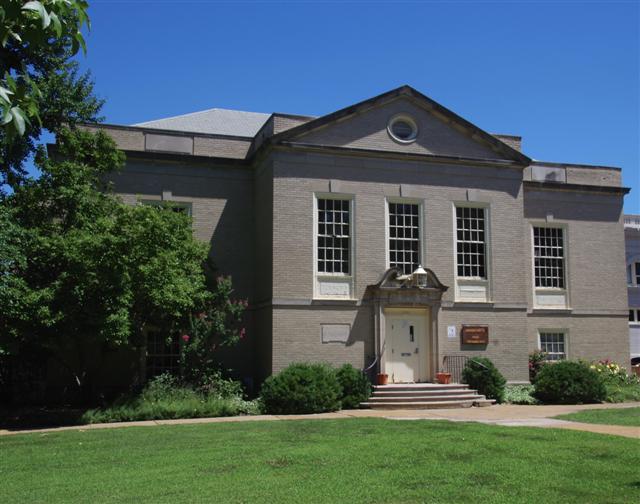
Other people offered skills that would be critical for any campaign. One person took over the tedious but essential work of keeping financial records and filing reports to the Missouri Ethics Commission. Another got photos of historical buildings to be used on the website and printed literature. One person built the web site and another set up the Facebook page. A different person found artwork for the Prop H logo and sent it to those designing the yard sign, literature and web site. A supporter found a graphic artist who arranged the photos and text for a great flyer that we used for a “literature drop.” Another supporter coordinated the printing of yard signs and literature and found a company that would place literature on door mats for considerably less cost than mailing them.
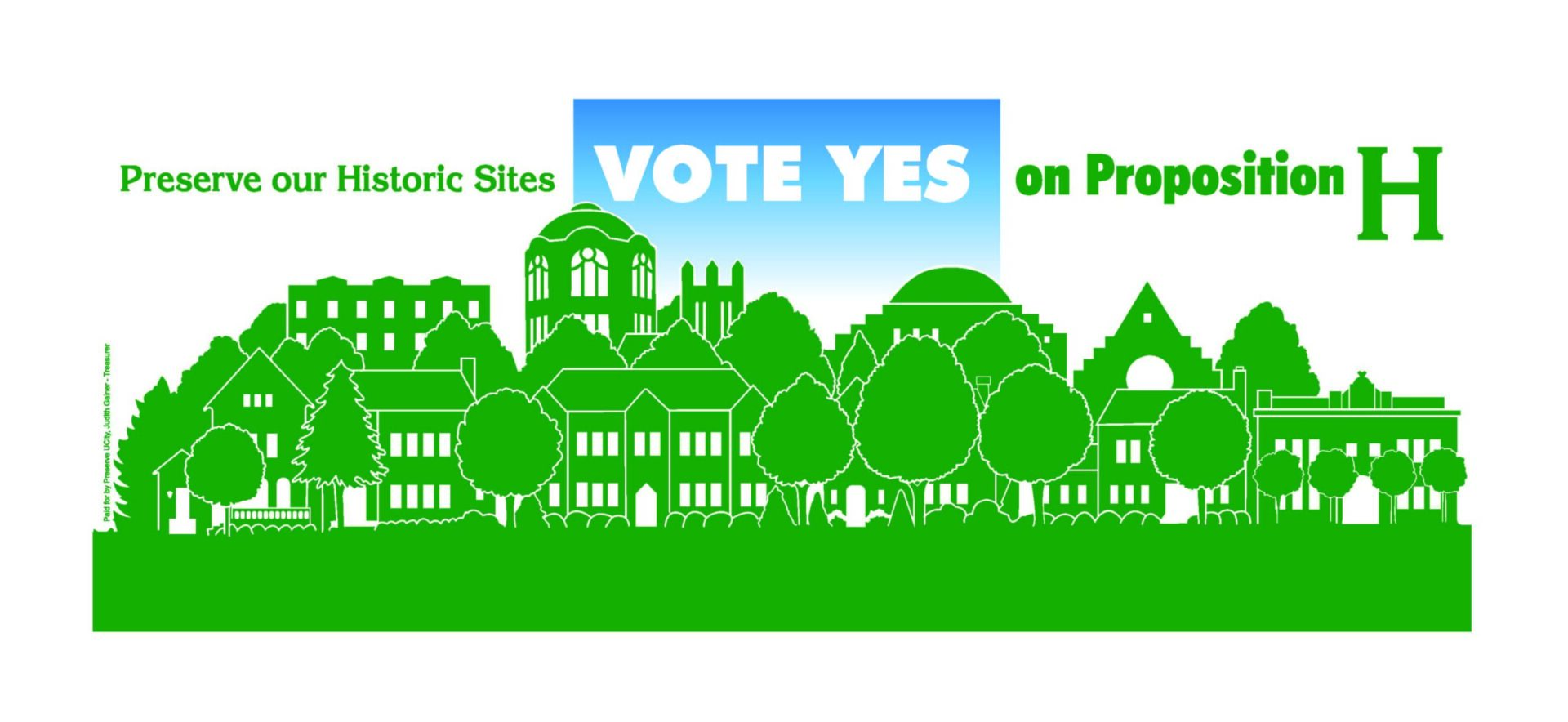
As I was giving out yard signs during a neighborhood meeting, someone asked, “I don't know if you could use a short movie, but I'm a professional filmmaker and could create one.”
“We've been looking for you but didn't know who you were,” I let him know. “At one of our meetings, we thought it would be great to have 1-2 minute movies about what some of the historical buildings mean to people to put on our web site.” With lots of coordination, help from another supporter who could make YouTube movies, and seven U City residents who were movie stars for a very brief time, we had an active web site.
I had the unique talent of producing a local TV show, Green Time. We created a special episode with Esley as guest, using some of the short movies and photos we had received.
Collecting signatures had provided us with a list of 3500 people who would be likely to vote with us. As the voting day approached and only a few dozen yard signs remained, one supported gleaner through the signature sheets to find the addresses of those living on the most heavily traveled streets. Others went to those homes to get signs up.
Hundreds of U City residents came to a strategy/planning meeting, donated to the campaign, put up a Prop H yard sign, and/or asked to be listed as an endorser. We were able to lists endorsers who were candidates for councilmember from Wards 1, 2 and 3: Terry Crow, Paulette Carr and Bwayne Smotherson.
The vote
During the last meeting before the election, the mayor's council friends introduced a resolution giving full support to historic buildings with a promise to set up a committee to study how to do to. Several of us crafted amendments to expose it as a toothless substitute for genuine historic preservation whose only purpose was to persuade citizens it was unnecessary to vote in favor of Prop H. Those motions proved unnecessary. Since even the mayor's allies were embarrassed by such a crassly manipulative act, the entire motion was tabled until after the election.
By the time April 5 rolled around, we had worked with so many people on so many U City issues and so many people with other primary concerns had devoted either a little or a lot of time to Prop H that the multiplicity of issues were completely intertwined. But Prop H was the only issue that U City residents could vote on.
Voting “Yes” on Prop H thus expressed the will of those dedicated to historic preservation, University Heights residents who do not want an off-campus Washington University dorm/parking lot as a neighbor, those who support unions in general, firefighter backers in particular, people who believe children should have summer camps and playgrounds, those who want transparent city council meetings, everyone tired of vicious attacks such as those against Terry Crow, those who dislike the suppression of dissent however the mayor's team carries it out, and those appalled at the violence creeping into U City politics.
Nevertheless, the mayor had very powerful forces on her side. Her staunch supporters on the council (Kraft, Glickert, Jennings) were not up for re-election, meaning that she would retain a majority however the vote went. If Crow, Carr and Smotherson were defeated, she would have a unanimous council that would hop on whatever wagon she rolled out. On her side were developers, investors, and a small army of loyalists who would echo anything she said while stomping out thoughtcrime.
The April 5 race looked like it could be very tight – less than 1% of the vote tight. In 2014, Kraft won by 22 votes and Rod Jennings beat Bwayne Smotherson by 6 votes.
This closeness should be kept in mind when realizing that working the polls for a proposition is quite unlike doing so for a candidate. While virtually everyone knows which candidates they will vote for, many do not decide how they will vote on a proposition until they are in the voting booth. This is why it was so important for Prop H supporters to work the polls on April 5.
Luckily, Prop H had a strong supporter in Suzanne Greenwald, who both knows how to organize and has the energy to do it thoroughly. After dozens of phone calls and emails, she had someone scheduled to pass out Prop H literature at each poll during each heavy voting time (early morning, lunch, and late afternoon to closing) and several of the times in between.
As the votes came in, U City saw progressive forces winning everywhere. Terry Crow took 59% of the vote in Ward 1; Paulette Carr 67% in Ward 2; and, Bwayne Smotherson, with 55% of the Ward 3 vote, was 25% ahead of his closest rival. Prop H won over 69% of the vote, impressive because it was the only vote spanning all three wards. U City voters were searching for a new path.
The future
Prop H does more than change politicians. It empowers citizens to have veto power over a type of decision that politicians can make. Victories such as the vote for Prop H can be profound, yet, at the same time illusory and reverseable. History is littered with the corpses of cities, states and provinces who won votes only to be crushed by outside powers greater than they realized. The single greatest threat to the Prop H victory is the belief that we can sit back and relax because the fight has been won.
The issue of outsourcing ambulance service and selling historic buildings are no more University City-only issues than contaminated drinking water is a Flint-only issue. Both are specific manifestations of the broader pattern of privatizing what should remain in the hands of local people. There should be little doubt that if U City had defeated all three candidates along with Prop H, not just historic buildings but public parks and city schools would be up for outsourcing within a few years.
How could the Prop H victory be undone? One way would be to overturn it at a higher level of government. With an increasing number of municipalities and states demanding labeling of genetically contaminated food, legislation such as the “Monsanto Protection Act” and the “Dark Act” aim to nullify laws at a federal level.
An even bolder step would be inclusion in an international trade agreement of a provision that local governments which seek buyers for public services or properties must announce sales internationally. The combination of a state's removing the right of citizens to vote on disposal of property with a trade deal (like NAFTA or TPP) requiring the promotion of international sales could mean that public property across the US would go on the global market.
The point is not to despair but to realize that the other side is playing a game much bigger than “localism” and we must expand our horizons. Just as the University Heights neighborhood could not win without an alliance with the rest of University City, U City cannot sustain a long-term battle without a broad alliance with anti-privatization groups.
This requires recognizing that privatization is core and the behavior of the U City mayor, despite being obnoxious in the extreme, is merely symptomatic. She acts undemocratically mainly because she can't figure out how to manipulate people into accepting her outsourcing gimmicks. Like slavery or unending war, the vice of privatization would not change if a demagogue could persuade people that it was a virtue.
The basic flaw with outsourcing is the assumption that private companies can always organize work better and eliminate waste. In reality, this has nothing to do with privatization. The only thing it accomplishes is that people at the top having higher incomes and people at the bottom having lower wages and benefits than government employees.
We stand at a turning point of history. In 2016, the global trend is toward outsourcing everything. This could result in the destruction of historical treasures, reversing the gains that working people have made over the last century, and create absolute environmental degradation until the planet is unlivable for humans. This trend can be slow, not arriving until 2100 or later. Or, it could be quick, reaching us by 2030. Or, it could be stopped. Our job is to do everything in our power to reverse it. Local control via charter amendments is one small but significant piece of a strategic puzzle. Whatever our methods, our overall goal is to transfer power from the 1% to the vast majority.
Don Fitz is a 30 year resident of University Heights. He produces Green Time TV in St. Louis, is on the National Committee of the Green Party USA and can be contacted at fitzdon@aol.com
Ed Nickels took all photos of public buildings.
